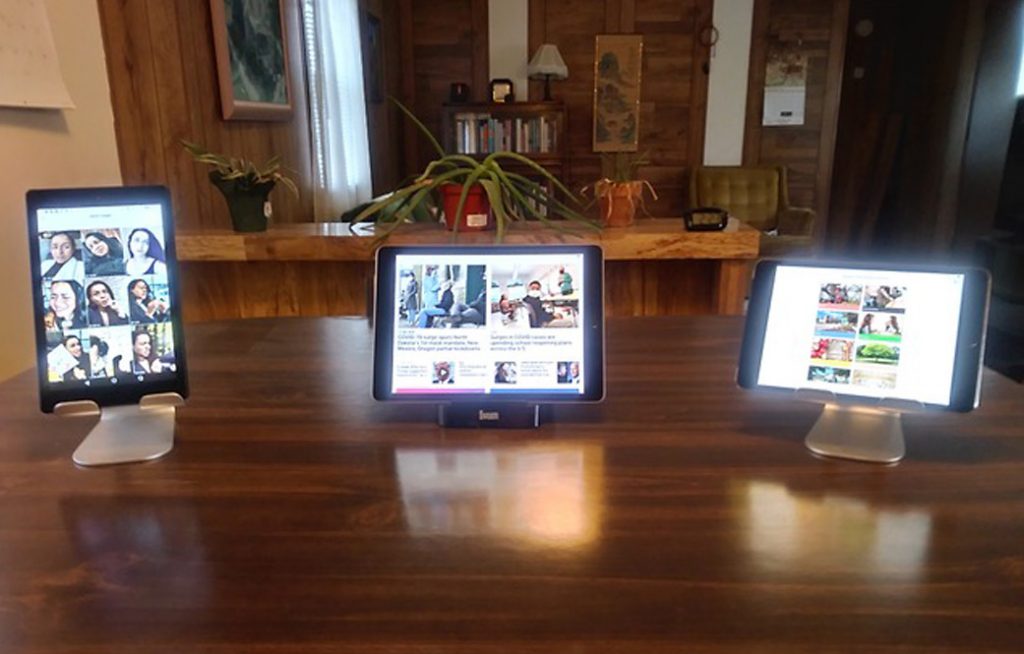
You need only glance at my kitchen table to see how bad it is: there are three tablets mounted on stands.
The tablet on my left is an 8-inch Amazon Fire, which I use for online Scrabble, TikTok videos, and other urgent matters. Front and center is a 10-inch iPad for reading the news. And on my right is an 8-inch iPad mini, which I mainly use for texting and social media.
I can’t begin my morning without sitting down to breakfast at my kitchen table cockpit and reading a gazillion news stories, courtesy of the flood of emails in my inbox filled with headlines. The New York Times alone sends me five collections: Today’s Headlines, The Morning, Opinion Today, On Tech, and The Great Read. I go through all of them and inevitably find many articles that I absolutely must read.
Other daily emails with headlines include The Guardian, The Ottumwa Courier, ScienceAlert, Time (two daily editions), News Break (several times a day), CNET Now, Iowa Public Radio, and The Atlantic.
My favorite daily is NextDraft, Dave Pell’s often humorous summaries of, and links to, the most important, interesting, and entertaining content from around the internet.
Then there are the dozen or so weekly emails pointing to content that I also must read.
I blame the coronavirus. I’ve always been addicted, but it became worse once I was spending more time at home as well as eating alone.
An hour lunch stretches into two, as I keep finding stuff to read.
All that was bad enough, but then I also got hooked on Facebook, which is like the meth of internet addiction.
What’s not to love about a viral video of six parrots playing basketball? Seriously. Three yellow parrots teaming up against three green ones, each team focused on putting the ball in the little basketball hoop at their end of the little court (bit.ly/3osCRH1).
It looks like a real basketball game. A green parrot heads toward the basket with the yellow parrots trying to steal the ball. One succeeds and zooms down to the other end of the court and makes a layup.
I’d ignored Facebook for years. I was the second person in Fairfield to sign up, back when it was available only to those affiliated with a university. I eventually had hundreds of friends, as people invited me to connect. But I had it set up to send me email alerts if one of my close friends or relatives posted.
Then one day a few months ago I happened to look at my News Feed, which I had almost never done, and saw that an acquaintance had passed away. Other things also began to grab my attention, such as news about the virus and posts related to politics. Plus, the endless stream of humor and viral videos like parrots playing basketball.
Gradually, I began heading to Facebook multiple times a day. I joined Facebook groups related to Fairfield, COVID-19, politics, and others. Soon, it seemed like it wasn’t an option: I had to go there to check things out.
This is, of course, by design. Facebook engineers have explicitly created their algorithm to keep you on the site as long as possible. Every time you click Like or watch a viral video, Facebook is learning about you. Research has shown that Facebook actually knows a person better than his or her spouse does, and they use that knowledge to keep you there.
Speaking to Congress in September, former Facebook manager Tim Kendall said that in creating the algorithm, Facebook “sought to mine as much attention as humanly possible. . . . We took a page from Big Tobacco’s playbook, working to make our offering addictive at the outset.”
Addiction is never good. Research shows that those who spend more time on social media are more prone to depression. Plus, studies suggest internet addiction reduces one’s attention span.
Even more worrying may be the fact that Facebook and other social media appear to be creating reality bubbles. Facebook tends to show you posts of people who share your views, and to suggest related groups. One gets more and more locked into a particular perspective.
And sometimes that perspective is bizarre and dangerous, which is why Facebook has shut down hundreds of QAnon private groups and has banned QAnon from the platform.
In his testimony, Tim Kendall also said, “At the very least, we have eroded our collective understanding—at worst, I fear we are pushing ourselves to the brink of a civil war.”
That’s enough to upset a guy’s lunch. But I’m obliged to sit at my kitchen table cockpit. I am, after all, your very popular tech columnist. It’s my job to track these things.
But I have indeed noticed that my attention span seems to be declining. So I’m resolved to cut back on my news consumption and my Facebook visits.
And I’ve begun to avail myself of the perfect antidote: reading a book. It’s about time.
Find column archives at JimKarpen.com.
